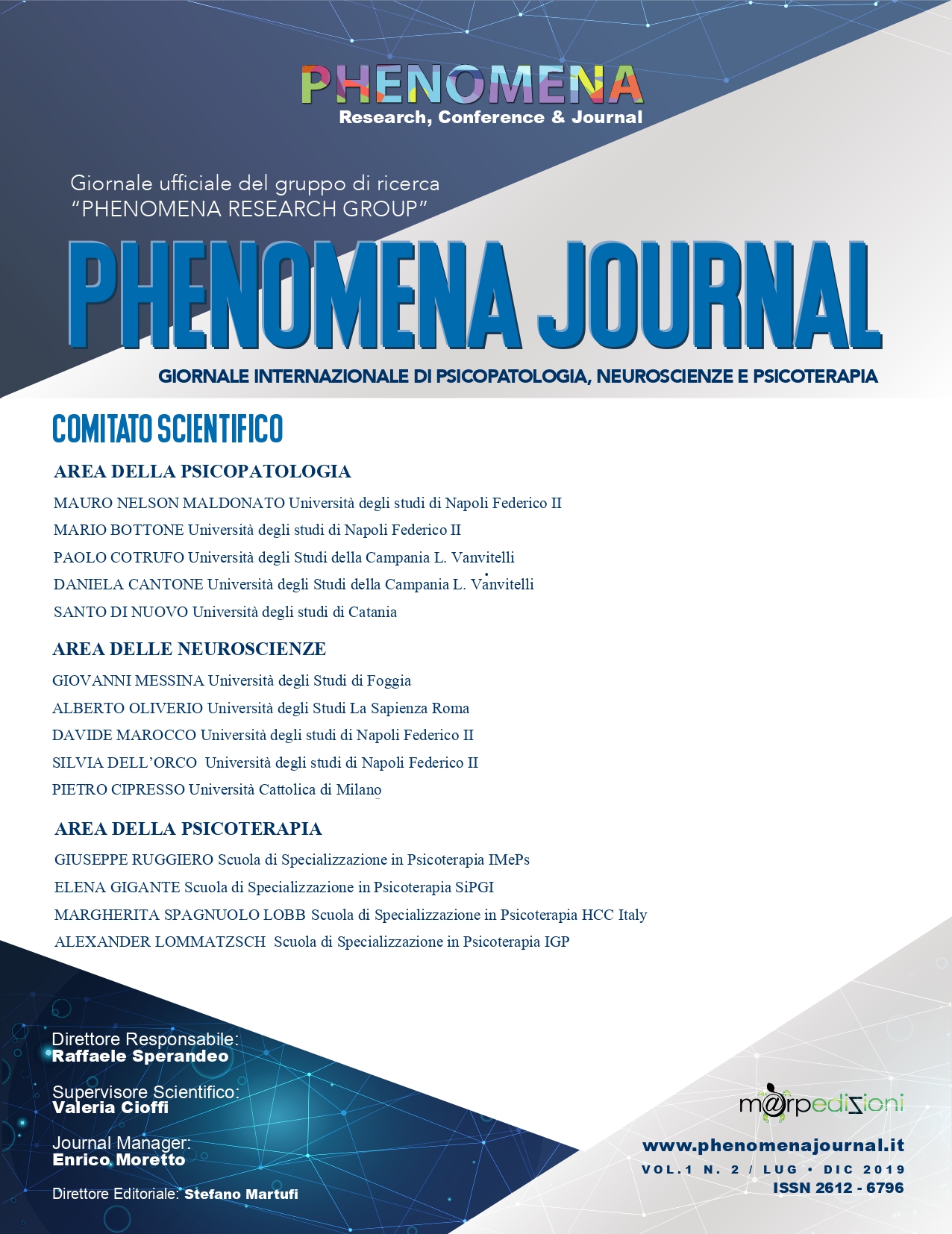Personalità: Neuroscienze, Psicopatologia e Psicoterapia: Visione attuale e prospettive future negli studi di ricerca
Pubblicato 05.11.2019
Come citare
Abstract
Background: This article analyzes the current conceptualization of the personality construct, in until now prevalently understood in a psychopathological key, through categorical classification systems such as the Diagnostic and Statistical Manual of Mental Disorders (DSM). Subsequently, is presented an alternative perspective to the predominant and monolithic one, such as that offered by the Gestalt phenomenological approach: it identifies the constitutive elements of the personality, biological, relational and environmental/social, in order to identify maladaptive personality functioning. In view of a “stratified medicine” system, we support the idea that the need for therapeutic treatments is based on the integration of the current diagnostic-categorical classification systems with a holistic view of the individual is supported.
Conclusions: This work aims to supports the phenomenological vision as a theoretical basis for a medium and long-term scientific study of personality, supported by the use of psychometric, biometric and neuroscience tools in the evaluation and treatment phases.
Keyword: Personality, Neuroscience, Psychopathology, Psychotherapy.
Abstract in italiano
Contesto: Questo articolo analizza l’attuale concettualizzazione del costrutto della personalità, fino ad ora prevalentemente inteso in chiave psicopatologica, attraverso sistemi di classificazione categorici come il Manuale diagnostico e statistico dei disturbi mentali (DSM). Successivamente, viene presentata una prospettiva alternativa a quella predominante e monolitica, offerta dall'approccio fenomenologico: esso identifica gli elementi costitutivi della personalità, biologici, relazionali e ambientali / sociali, al fine di identificarne il funzionamento disadattivo. In vista di un sistema di “medicina stratificata”, si sostiene la necessità di trattamenti terapeutici basati sull'integrazione degli attuali sistemi di classificazione diagnostico-categoriale con una visione olistica dell'individuo.
Conclusioni: Questo lavoro mira a supportare la visione fenomenologica come base teorica per uno studio scientifico a medio e lungo termine della personalità, supportato dall'uso di strumenti psicometrici, biometrici e neuroscientifici nelle fasi di valutazione e trattamento.
Parole chiave: Personalità, Neuroscienze, Psicopatologia, Psicoterapia.
Riferimenti bibliografici
- Bibliografia
- Clarkin, J. F., Lenzenweger, M. F., Lingiardi, V., & Madeddu, F. (Eds.). (1997). I disturbi di personalità: le cinque principali teorie. Cortina.
- Polster, E., & Polster, M. (1986). Terapia della Gestalt integrata: Profili di teoria e pratica. Giuffrè.
- Lobb, M. S. (2011). Il now-for-next in psicoterapia. La psicoterapia della Gestalt raccontata nella società post-moderna. FrancoAngeli
- Francesetti, G., Gecele, M., Roubal, J. (2014). La psicoterapia della Gestalt nella pratica clinica. Dalla psicopatologia all'estetica del contatto. Franco Angeli.
- Oldham, J.M., Skodol A.E., Bender D.S. (2017). Trattato dei disturbi di personalità. Raffaello Cortina Editore.
- Maffei, C., Battaglia, M., & Fossati, A. (2002). Personalità, sviluppo e psicopatologia. Rome, Italy: Laterza.
- Pervin, L. A., John, O. P., & Porzionato, G. (1998). La scienza della personalità: teorie, ricerche, applicazioni. R. Cortina..
- Lewin, K. (1951). Field theory in social science: selected theoretical papers (edited by dorwin cartwright.).
- Perls, F. (1951). Gestalt therapy/Perls F., Hefferline RF, Goodman P.
- Zahavi, D., & Gallagher, S. (2014). La mente fenomenologica. Alianza Editorial.
- Ginger, S., & Ginger, A. (2004). La Gestalt. Terapia del «con-tatto» emotivo. Edizioni Mediterranee.
- Delisle, G. (1992). I disturbi della personalità (Vol. 3). Sovera Edizioni
- Perls, F., Hefferline, R. F., & Goodman, P. (1971). Teoria e pratica della terapia della Gestalt: eccitamento e accrescimento nella personalità umana. Astrolabio.
- Zerbetto, R. (1998). La Gestalt: terapia della consapevolezza. Xenia.
- Lingiardi, V., & Muzi, L. (2018). Il Manuale Diagnostico Psicodinamico (PDM-2): un'occasione di dialogo interdisciplinare. Giornale italiano di psicologia, 45(4), 781-804.
- Steger, M. F., Hicks, B. M., Kashdan, T. B., Krueger, R. F., & Bouchard Jr, T. J. (2007). Genetic and environmental influences on the positive traits of the values in action classification, and biometric covariance with normal personality. Journal of Research in Personality, 41(3), 524-539.
- Conati, C., Chabbal, R., & Maclaren, H. (2003, June). A study on using biometric sensors for monitoring user emotions in educational games. In Workshop on Assessing and Adapting to User Attitudes and Affect: Why, When and How.
- Hwang, K., Kwon, A. & Hong, C. (2017). A Preliminary Study of New Positive Psychology Interventions: Neurofeedback-Aided meditation therapy and modified positive psychotherapy. Current Psychology 36(3) 683–695.

